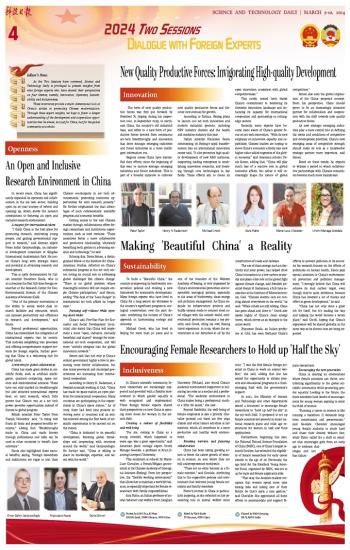
 |
In recent years, China has significantly expanded its openness and collaboration in the sci-tech sector, building upon its 46-year journey of reform and opening-up, which shows the nation's commitment to fostering an open and inclusive research environment.
A magnet for international talent
"I think China is the best place for promoting research, motivating young people, and gaining governmental support in research," said German expert ?mer Sahin Ganiyusufoglu, an industrial development consultant at Qingdao International Academician Park. He noted China's long-term strategic vision and potential in advancing research and development.
This is aptly demonstrated by Italian scientist Francesco Faiola, who in 2014 became the first full-time foreign researcher at the Research Center for Eco-Environmental Science of the Chinese Academy of Sciences (CAS).
"One of the primary motivations is the ability to access world-class research facilities and resources, which can increase productivity and efficiency in research and development," said Faiola.
Beyond professional opportunities, China has streamlined the integration of international experts into its society. This includes simplifying visa processes and offering comprehensive support services for foreign experts, further proving that China is a welcoming hub for global talent.
A win-win for global collaboration
China has made great strides in scientific fields, such as artificial intelligence, quantum computing, space science and environmental sciences. These have not only marked its breakthroughs but also attracted international experts keen on joint research, which fully proves that China's rise as a sci-tech power provides opportunities instead of threats to global progress.
British scientist Peter Taylor from Tianjin University said, "A rising tide floats all boats and progress benefits everyone," adding that "Breakthroughs made in China and made known through publications and talks can be used in other countries to benefit their activities."
Faiola also highlighted these mutual benefits, saying, "Foreign researchers and institutions are eager to join their Chinese counterparts in sci-tech advancements, presenting numerous opportunities for joint research projects." He further emphasized the dual advantages of such collaborations: scientific progress and economic benefits.
Getting access to the vast Chinese market through collaborations offers foreign researchers and institutions opportunities, such as joint ventures. "These incentives foster a more collaborative and productive relationship, ultimately benefiting both parties in advancing science and technology," he said.
Echoing this, Denis Simon, a distinguished fellow at the Institute for China-American Studies, reflected on China's substantial progress in the sci-tech sector, noting its crucial role in addressing global challenges like climate change. "There is no global problem whose meaningful solution will not require ample Chinese participation," said Simon, adding "The days of the 'Lone Ranger' in international sci-tech affairs no longer exist."
Pursuing self-reliance while opening doors wider
China's 14th Five-Year Plan for Economic and Social Development (2021-2025) also stated that China will implement a more "open, inclusive, mutually beneficial and shared" strategy for international sci-tech cooperation, and will more "actively integrate into the global innovation network."
Simon said that not only is China's central government highly active in promoting cross-border collaboration, but also many provincial and municipal governments are increasing their international cooperation.
According to Henry H. Radamson, a Swedish scientist working at CAS, "China has made its space station an open platform for international cooperation. Many countries are participating in the experiments in China's space station." As of 2023, there had been nine projects involving some 17 countries and 23 entities selected among the first batch of scientific experiments to be carried out on the station.
"China is dedicated to its peaceful development, fostering global friendships and cooperating with countries around the world," said Ganiyusufoglu. He further said, "China is willing to share its knowledge, expertise, and talent with the world."







